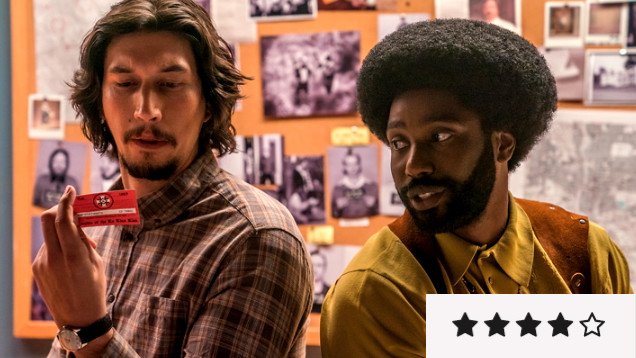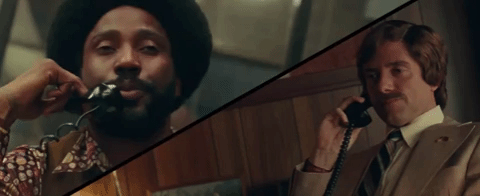BlacKkKlansman review: a dangerously funny comedy

With his racially-charged historical comedy BlacKkKlansman, veteran firebrand filmmaker Spike Lee finds himself in something resembling the political center – at least in relative terms. Adapted from a non-fiction book by Ron Stallworth, the director offsets the gritty texture and hand-trembling impact of his most memorable work (including Do the Right Thing, Clockers and Chi-Raq) with droll commentary about the cyclical nature of bureaucracy – a la Burn After Reading – and a farce-like plot that ping-pongs between absurd and shocking situations.
Lee depicts two extremes of America’s race wars: the militant Black Panther movement on the far left and the Ku Klux Klan on the far right. The director’s sympathies ultimately lie with Stallworth (John David Washington), an African American detective who – unlike his hot-blooded love interest Patrice (Laura Harrier) – fights the good fight through officially sanctioned means. Ron is at the heart of an undercover investigation, tasked with infiltrating the KKK. He provides the voice of a white bigot over the phone and his Jewish cop colleague Flip Zimmerman (Adam Driver) pretends to be this imaginary, seething racist in person.

Is the filmmaker suggesting one ought to change the system by working within it? If so there are certainly caveats, given Lee doesn’t exactly argue that the case in question in any way achieved meaningful progress. And yet the plucky spirit of the film is undoubtedly behind the protagonist and his pal, whose partnership riffs on an unexpected theme: the nature of performance. The chemistry between Washington and Driver pops and crackles, both actors playing characters within characters.
Lee has eased us into an Argo-esque commentary, putting silly absurd scenarios in front of a chillingly real background and pairing America’s race history with the history of cinema
Alec Baldwin kicks the film off in SNL mode, impersonating a white supremacist flubbing his lines in a direct-to-camera presentation. The purpose of this introductory sequence is to establish the film as a kind of terrible historical theatre. Frighteningly real implications are drawn – memorably, in a four minute documentary montage capturing recent events – but not before Lee has eased us into an Argo-esque scenario, pairing America’s race history with the history of cinema.
The director incorporates a famous scene from Gone with the Wind, showing Scarlett O’Hara moving through a train station filled with wounded Confederate soldiers. He also stages a disturbingly enthusiastic response (though not unexpected: it’s from Klansmen) to a screening of 1915’s Birth of a Nation, noting that then President Woodrow Wilson is believed to have described D.W. Griffith’s silent era blockbuster as “history written in lightning.” Spike Lee disagrees; it was history written in blood. And the cinema, like America itself, has many things to answer for.
Listening to Ron imitate a bigoted racist over the telephone, and watching Flip infiltrate the group, makes for dangerously good comedy: we laugh while our stomach turns. The film’s sense of unease is likely to register on a higher level for viewers au fait with the director’s grenade-lobbing style. Making a film this entertaining – this riotous and laugh out loud funny – without blunting the sharp, stinging, tragic bits at its core is a difficult trick to pull off, easily under-appreciated due to it apparent effortlessness.
Some may argue Lee has diluted his characteristic take-no-prisoners polemic. The kind of audience that might lament a change in approach, however, and call for a return to films more explicitly ‘challenging’ and ‘provocative’, are the same kind likely to concur with the director’s sentiments before they walk inside the cinema. It is bolder, surely, to take the approach of this very shrewd and entertaining film, using risqué comedy to appeal to a wider audience. In a strange way, BlacKkKlansman is Spike Lee’s most inspiring film: it encourages us to laugh bitterly at the past, while it sets fire to the history books.

















